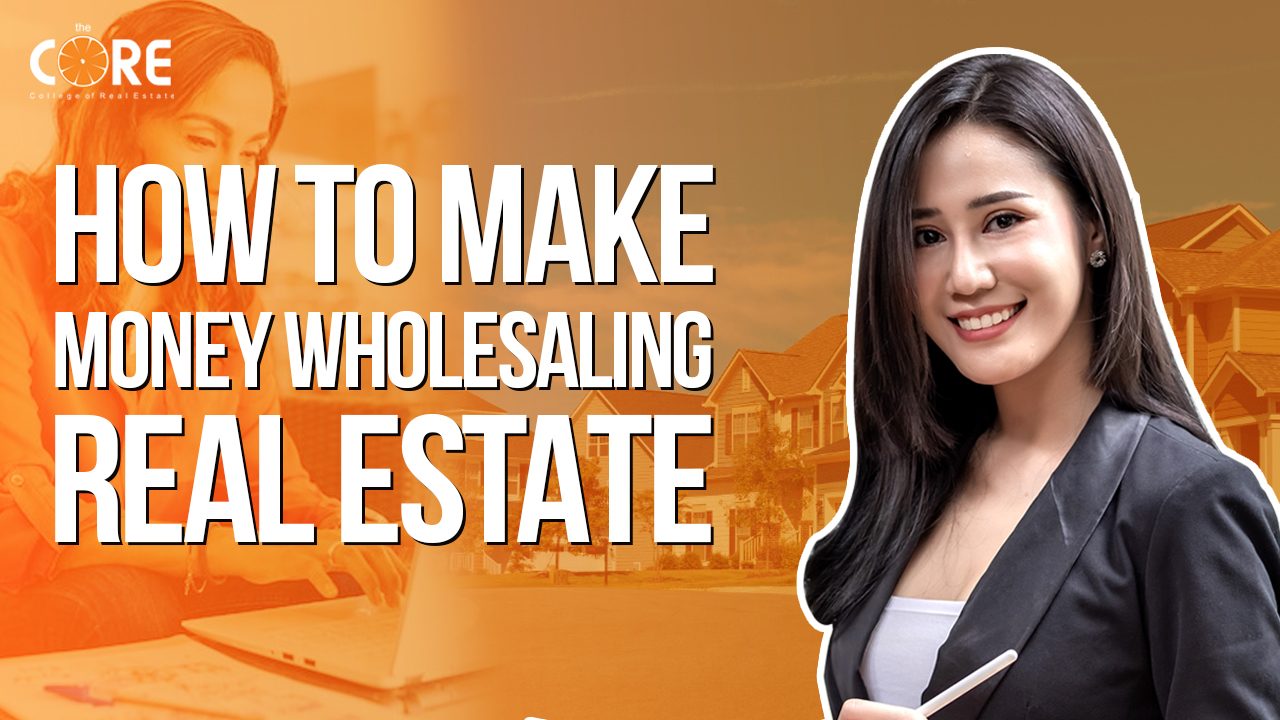How To Make Money Wholesaling Real Estate?

[mashshare]
People would have laughed at you if you had told them a decade ago that they could make money by doing wholesaling for free. The internet has made it easier than ever to earn just about anything you want. So, with all this content and information available, how did you know which ones to earn from and which ones actually work?
Luckily for you, CORE Member, for today’s blog we will be talking about how to make money in wholesaling real estate! Remember, that while the first step is completing any of this amazing blog, the second and possibly more important step is taking action even if it’s imperfect action.
Investing in real estate does not have to entail purchasing and occupying properties. Wholesale real estate is a great way to make money on real estate without having to take possession of it, but it takes a unique set of skills and dedication to succeed.
What Is Wholesale Real Estate and How Does It Work?
 If you’ve heard of the term “wholesale,” you’ll have a good idea of what real estate wholesaling entails. For real estate investors who enjoy finding undervalued properties, wholesale real estate is a short-term investment strategy. As part of their real estate investing strategy, wholesalers locate properties and place them under contract with the seller. They then locate a buyer for the property and sell the contract to the buyer for a fee. This investor will purchase the property, make necessary improvements, and then either sell it or rent it out.
If you’ve heard of the term “wholesale,” you’ll have a good idea of what real estate wholesaling entails. For real estate investors who enjoy finding undervalued properties, wholesale real estate is a short-term investment strategy. As part of their real estate investing strategy, wholesalers locate properties and place them under contract with the seller. They then locate a buyer for the property and sell the contract to the buyer for a fee. This investor will purchase the property, make necessary improvements, and then either sell it or rent it out.
In general, most people do not understand wholesaling or what a wholesaler is trying to do. That could be because wholesaling is not a known industry outside of the real estate world. If you think of most industries, people can generally name the top three companies in an industry. In retail, you have Amazon, Walmart, and Target. In shoes, you have Nike, Adidas, and Reebok. In housing you have Zillow, Trulia, and Realtor. But in wholesaling you have… what exactly? Wholesaling is not a known commodity.
If a wholesaler wants to overcome the obstacle of being unknown, we believe that part of the wholesaler’s job is to educate the public on what wholesaling is, how it can be a benefit to the community, and how the process works. If you have been doing this for any time at all, there are so many success stories that can be shared as examples for anyone going through the same scenarios. Use those as case studies for your audience.
What Is The Purpose Of Wholesaling Real Estate?
Wholesalers can find good deals on houses, secure them, and then sell the contract to the final buyer before the home sale closes. To put it another way, the wholesaler never owns the house. They land the good deal, but then sell the contract before it expires. When done correctly, the wholesaler receives a hefty finder’s fee while never taking possession of the property.
 If you get into this business, you quickly pick up on the negative connotations associated with wholesaling. You will also understand why there were so many negative stereotypes about wholesaling and wholesalers. In the market, there are many legit wholesalers that are truly trying to help people. But for every legit wholesaler, there is another one cutting corners, chasing the quick dollar, and building a business on dishonesty. From talking with others, the previous statement can be said about just about every market throughout the U.S.
If you get into this business, you quickly pick up on the negative connotations associated with wholesaling. You will also understand why there were so many negative stereotypes about wholesaling and wholesalers. In the market, there are many legit wholesalers that are truly trying to help people. But for every legit wholesaler, there is another one cutting corners, chasing the quick dollar, and building a business on dishonesty. From talking with others, the previous statement can be said about just about every market throughout the U.S.
In every business there are some bad apples that can ruin it for the bunch. So how can wholesalers who want to do things the right way overcome the negative connotation and stereotypes that surround this business?
-
Wholesalers don’t care about anyone they work with!
Wholesalers need to remember that in this business you are dealing with people’s lives and homes. When a seller signs that purchase agreement, it is emotional and real for them. It is usually an enormous release of a burden from their life. When a wholesaler is unable to perform, that burden becomes even larger for sellers. Wholesalers have to be empathetic when it comes to working with sellers.
Most sellers are in a distressed situation. Understanding what they are going through and putting yourself in their position will help you work toward a solution best for them and it will honestly be best for you, too. If you enter into a contract, it is up to you to do everything in your power to perform on that contract.
-
All wholesalers lie and don’t have any money to buy your house!
Please, stop telling people that you are going to buy their house if you aren’t, won’t, or can’t. There is so much bad education and practices out there for wholesalers, saying that their “partner” will be the one actually purchasing the house. That is a lie, and your buyers are not partners. Just tell the truth about the process and respect the seller enough to be honest with them. There is nothing wrong with explaining the true process with the seller.
Let them know what your intentions are, even if you do not have the money to purchase the property yourself. It’s ok to say that you won’t be the end buyer yourself, but you are great at connecting your buyers with properties. And if you cannot perform on the contract that you signed, have the conversation with the seller yourself, while giving them enough time to make arrangements as needed. If you handle yourself with integrity, your business will be better off in the long run.
The Process of Buying and Selling Wholesale Real Estate
 A real estate wholesaler purchases a home directly from the owner and then sells it to an investor for a slightly higher price, pocketing the difference as the wholesale fee. In a wholesale real estate transaction, the wholesaler initiates a wholesale deal or enters into a contract with a motivated seller. Typically, the sellers are facing foreclosure or are motivated to sell a distressed home as quickly as possible without having to fix it up.
A real estate wholesaler purchases a home directly from the owner and then sells it to an investor for a slightly higher price, pocketing the difference as the wholesale fee. In a wholesale real estate transaction, the wholesaler initiates a wholesale deal or enters into a contract with a motivated seller. Typically, the sellers are facing foreclosure or are motivated to sell a distressed home as quickly as possible without having to fix it up.
The wholesaler or real estate investor then searches for cash buyers, who are usually real estate investors who are willing to fix up the house themselves or have the funds to hire someone to do so. The wholesaler sells the contract to the investor in exchange for a transaction fee, also known as a “spread,” that the wholesaler and the investor agree on.
For example, let’s say Michell is approached by a wholesaler who offers to buy her home for $65,000. She is looking to sell the property quickly and seamlessly, so she agrees. The wholesaler and Michell sign a contract agreeing to the price and terms. The wholesaler then turns to a found investor who flips houses. The investor agrees that it’s a profitable property and proceeds to buy it for $70,000.
Michell sold her home quickly and pocketed $65,000, the investor bought a profitable fix and flip property for $70,000, and the wholesaler pocketed the $5,000 difference as the wholesale fee. In a nutshell, this is what real estate wholesaling looks like in action.
In short, think of the wholesaler as the middleman between seller and investor. Real estate wholesaling is a very short-term investing strategy, often with distressed or on-the-verge-of-foreclosure homes that owners are looking to sell quickly and effortlessly.
What types of properties are best for wholesalers? What’s the best way to locate them?
 Because part of the appeal of real estate wholesaling is the low capital requirements, wholesalers frequently target distressed properties, incentivizing homeowners to sell their homes for less than market value. You must network, network, and network some more to be a successful wholesaler. The more industry contacts you have and the more meetings and events you attend, the more likely it is that you will not only find properties, but also have access to buyers.
Because part of the appeal of real estate wholesaling is the low capital requirements, wholesalers frequently target distressed properties, incentivizing homeowners to sell their homes for less than market value. You must network, network, and network some more to be a successful wholesaler. The more industry contacts you have and the more meetings and events you attend, the more likely it is that you will not only find properties, but also have access to buyers.
For new wholesalers looking to connect with agents, contractors, and appraisers, organized meetings between local real estate professionals and investors are ideal. Following these meetings, e-blasts or newsletters highlighting available properties for sale are frequently sent out to mailing lists.
Looking for off-market properties for sale by owner online, putting up bandit signs, mailing flyers, and working with real estate agents who specialize in investment properties are all common ways to connect with sellers. Searching probate court documents for potential properties is also a good way to find them. You can use more targeted marketing efforts to send flyers or letters to homeowners proposing to buy their property once you have access to the documents.
As a wholesaler, it’s also critical to have a title company, contractor, and appraiser on your team to help close the deal and make the process go more smoothly. Getting a property appraised ensures that you are paying the correct price for it and that you will be able to resell it for a profit. The title company conducts a search on the property to ensure that it is legitimate real estate, and the contractor can inspect the property and prepare a repair estimate—an important detail for when it comes time to find a buyer.
A wholesaler’s math abilities are just as important—if not more so—and the longer you’ve been a successful wholesaler, the easier the math becomes. Knowing what to offer a seller starts with the end in mind, which means you’ll have to work backwards to come up with a figure that benefits the seller, you as the wholesaler, and the investor who will flip the property.
How To Wholesale Real Estate: Step By Step!
Setting up your business is the first step in getting into wholesaling real estate. In the United States, this means you’ll probably want to start by forming a limited liability company (LLC) to run your wholesale real estate business. After that, you’re ready to go out and look for investment properties in the real estate market. To get started in wholesale real estate, follow these steps.
-
Locate a distressed property or a seller who is eager to sell.
 You must find motivated sellers of distressed properties to make real estate wholesaling work. These sellers want to sell their home quickly and are unwilling to go through the traditional channels of a real estate agent, mortgage lender, earnest money, and home inspections or appraisals. Instead, they prefer to sell to a cash buyer who can close quickly before the property goes into foreclosure. Motivated sellers will usually sell for less than market value in order to get out of the house as soon as possible.
You must find motivated sellers of distressed properties to make real estate wholesaling work. These sellers want to sell their home quickly and are unwilling to go through the traditional channels of a real estate agent, mortgage lender, earnest money, and home inspections or appraisals. Instead, they prefer to sell to a cash buyer who can close quickly before the property goes into foreclosure. Motivated sellers will usually sell for less than market value in order to get out of the house as soon as possible.
If you bid far enough below market value, you’ll have enough room to put the house under contract with your team of investors for a higher price. This is critical in order for you to profit or earn a “finder’s fee” for facilitating the transaction. You must advertise yourself as a cash buyer of distressed properties via direct mail, social media, and even word-of-mouth to find the owners of distressed properties. The more people who are aware of your services, the more homes you will have available to contract.
-
Work out a deal with the seller
 When you’ve found the perfect property, it’s time to talk to the seller about a deal. One of the most crucial steps in the procedure is this one. If you bid too high, you won’t be able to profit when the contract is assigned to the final investor. The seller may reject your offer if you do not bid high enough. Be professional, courteous, and give the seller reasons to trust you when negotiating a real estate purchase agreement with the seller. Tell the seller about your experience, as well as how many other sellers you’ve assisted in avoiding foreclosure or defaulting on their mortgage.
When you’ve found the perfect property, it’s time to talk to the seller about a deal. One of the most crucial steps in the procedure is this one. If you bid too high, you won’t be able to profit when the contract is assigned to the final investor. The seller may reject your offer if you do not bid high enough. Be professional, courteous, and give the seller reasons to trust you when negotiating a real estate purchase agreement with the seller. Tell the seller about your experience, as well as how many other sellers you’ve assisted in avoiding foreclosure or defaulting on their mortgage.
It’s also necessary to have a keen eye for detail. You should be able to tell what improvements the house requires just by walking around it. You can use this information in your negotiation by telling the seller how much money it will cost to fix up the house to help you negotiate a lower rate. The less money you agree to pay the seller, the more likely it is that you will be able to find investors who see a profit opportunity.
-
Complete and sign the contract
Draw up a wholesale contract once you and the seller have agreed on a price. You can hire a real estate attorney or agent to do it for you, or you can do it yourself. You’ll save money if you do it yourself, but there’s a chance something will go wrong. If you’re unfamiliar with real estate contracts, it’s a good idea to seek legal advice.
-
Look for a final buyer
You’ll have to rely on your network of real estate investors to find a final buyer. While you may not personally know anyone who is interested, someone you know may. Use social media and local real estate meetups to expand your network. You’ll assemble a group of real estate investors to buy the properties you find as you grow your real estate wholesale business. This is the person who will take possession of the property, or the end buyer.
-
Work out a deal with the buyer
You’ll then negotiate with the end buyer how much you stand to make on the sale of the contract, just as you did with the seller. This is where you’ll work out the details of your transaction fee. This could be a standard fee you charge, or it could be something specific you and the buyer agree on.
-
Distribute the Contract
You must complete an assignment of contract agreement to assign the contract you signed with the seller to the buyer. This agreement states that you will assign your contract with the seller to your end buyer for the agreed-upon price. The difference between the amount you agreed to pay the seller and the amount the buyer agreed to pay you for the home is stated in the contract. The buyer agrees to purchase and take possession of the property. You (the seller) agree to accept the fee as a contract assignment, which gives you no ownership rights in the house.
-
Complete the transaction
Settlement is the last step. This is the point at which all parties sign the documents, and the deed is transferred to the final buyer. The wholesaler (you) is not required to make any out-of-pocket payments. The final buyer is responsible for all closing costs as well as the home’s price. You give the money to the seller and keep only your profit, which is the difference between your sales price and the price you agreed with the end buyer.
The following are some key numbers to consider when determining the best maximum allowable offer (MAO)—or the price you’ll pay for the property:
- The profit of the flipper (have you found a flipper, and if so, how much do they want for the property?)
- ARV stands for after-repair value (the final price the house flipper is going to sell the property for)
- Costs of repairs (how much will it cost to repair the property?)
- Fixed costs (how much will the flipper have to pay for the deal?)
- The wholesale profit (how much do you want to make as a wholesaler?)
Experience and success, as with most things, make it easier to put a value on these factors, resulting in a faster and easier process with each successful property purchase you make.
What are the dangers of working as a real estate wholesaler? While wholesaling is legal, there has been some debate over whether it is essentially brokering real estate without a license. Brokering laws, on the other hand, differ significantly from state to state, leaving room for interpretation. Wholesalers, as middlemen, aren’t looking to settle on the property; instead, they’re looking to assign the contract to another investor. Finally, a newcomer to the real estate market may find wholesaling appealing because it requires very little capital to make a profit.
That’s it for this blog CORE Member, remember to subscribe to our channel and if you feel like we’ve delivered value please share this blog with ONE person. That’s right just one person as a token of your appreciation for the hard work we put into making content that educates and helps you on your mission of building your own fortune. Remember you can read blog after blog, but it isn’t until you actually take action that you’ll start to see results. See you soon!
[mashshare]





